Prometheus
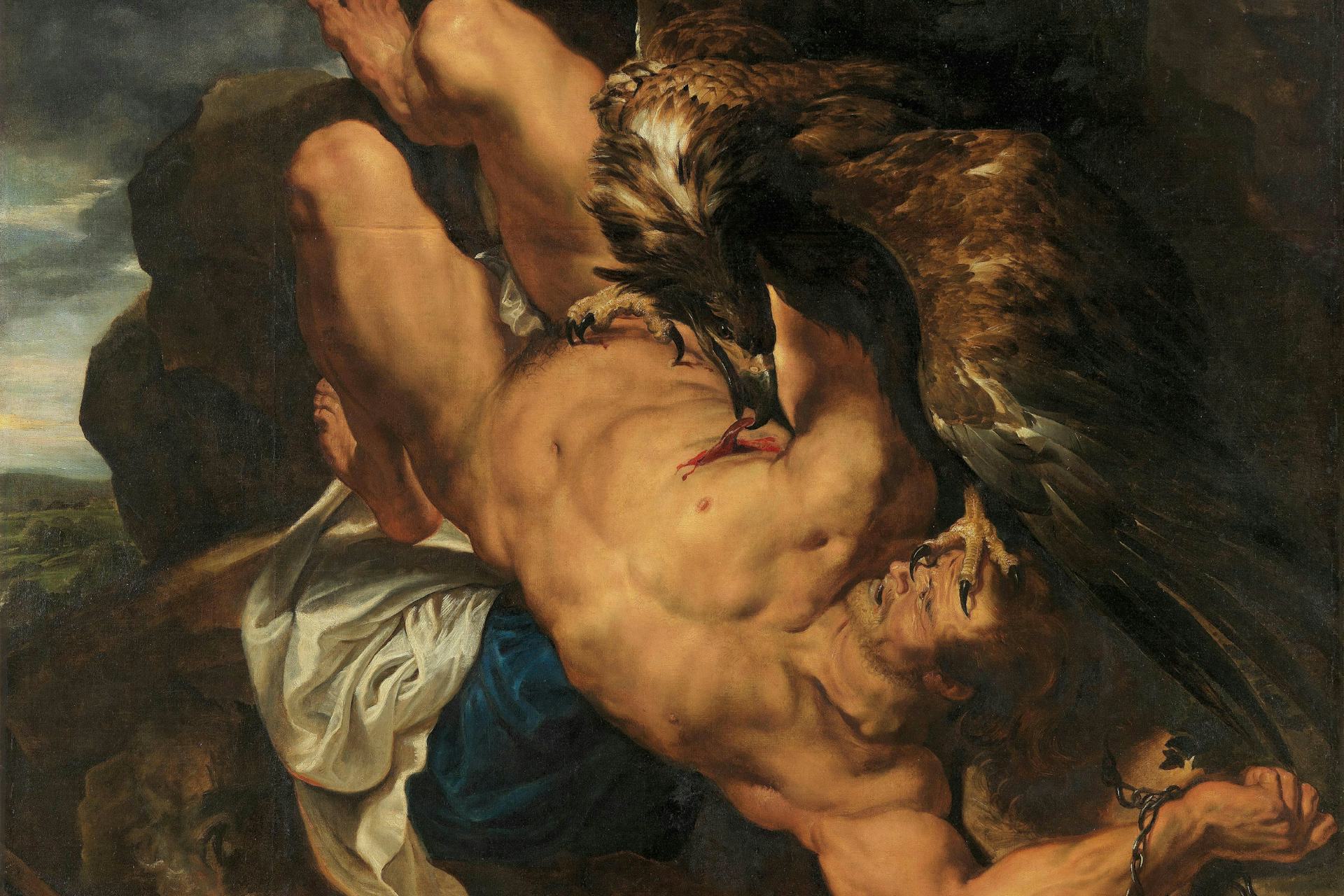
Overview
Prometheus, son of Iapetus, was a crafty Titan who acted as a benefactor of the first humans, giving them fire in defiance of the mighty Zeus. For this crime, he was fastened to a rock, where an eagle ate his liver every day for all eternity. Prometheus was also the father of the mortal Deucalion, a hero who helped to repopulate the world after a great flood nearly destroyed mankind.
For the Greeks and many who followed, Prometheus was revered as a champion of humanity, as well as a fount of wisdom, reason, and knowledge. In Athens, the center of his ritual observance, he was credited as the bringer of not only fire but also metallurgy as well. Alongside Athena and Hephaestus, Prometheus was celebrated by the city in connection with technology, craft, and the civilized arts.
Etymology
The name “Prometheus” (Προμηθεύς, translit. Promētheús) stemmed from the Greek prefix προ- (pro-), meaning “before,” and the verbal root μηθ-/μαθ- (mēth-/math-), meaning “to think” (itself derived from the Indo-Germanic root *mendh-/*men-, also meaning “to think”).[1] Prometheus is thus often translated as “forethinking”—one who knows or thinks about something before others. This name could be indicative of Prometheus’ role in bringing fire and metallurgy to humanity. It also distinguishes Prometheus from his brother Epimetheus, whose name is conversely translated as “afterthinking.”
Another possible etymology, derived from Indo-European linguistics, argues that the name actually originated from the Sanskrit root math-, meaning “to steal.”[2] In this case, “Prometheus” thus refers to his theft of fire rather than to his intellectual capacities.
Pronunciation
English
Greek
Prometheus Προμηθεύς (translit. Promētheús) Phonetic
IPA
[pruh-MEE-thee-uhs, -thyoos] /ˈprəˈmi θi əs, -θyus/
Epithets
Prometheus was given a handful of epithets in Greek literature, including πυρφόρος (pyrphóros, “fire-bearer”) and αἰπυμήτης (aipymḗtēs, “lofty-minded”).
Other Names
According to Hesychius of Alexandria, a scholar of the fifth or sixth century CE, Prometheus was also called Ithas or Ithax (though in some traditions Ithas/Ithax was a distinct figure).[3]
Attributes
Prometheus was known above all for his shrewd intelligence and cunning. During the Titanomachy, which pitted the Titans against the Olympian deities, Prometheus betrayed his brethren and sided with Zeus. However, this prudent choice of allegiance did not mean that Prometheus’ actions were always well advised. According to Hesiod, Prometheus was guilty of hybris (“insolence” or “hubris”) in trying to outwit Zeus.
This ended poorly for the Titan, who is most commonly remembered for his gruesome punishment: Prometheus was chained to a cliff and had his liver torn out each day by an eagle. Because Prometheus was immortal, his liver would grow back, only to be torn out anew the next day.
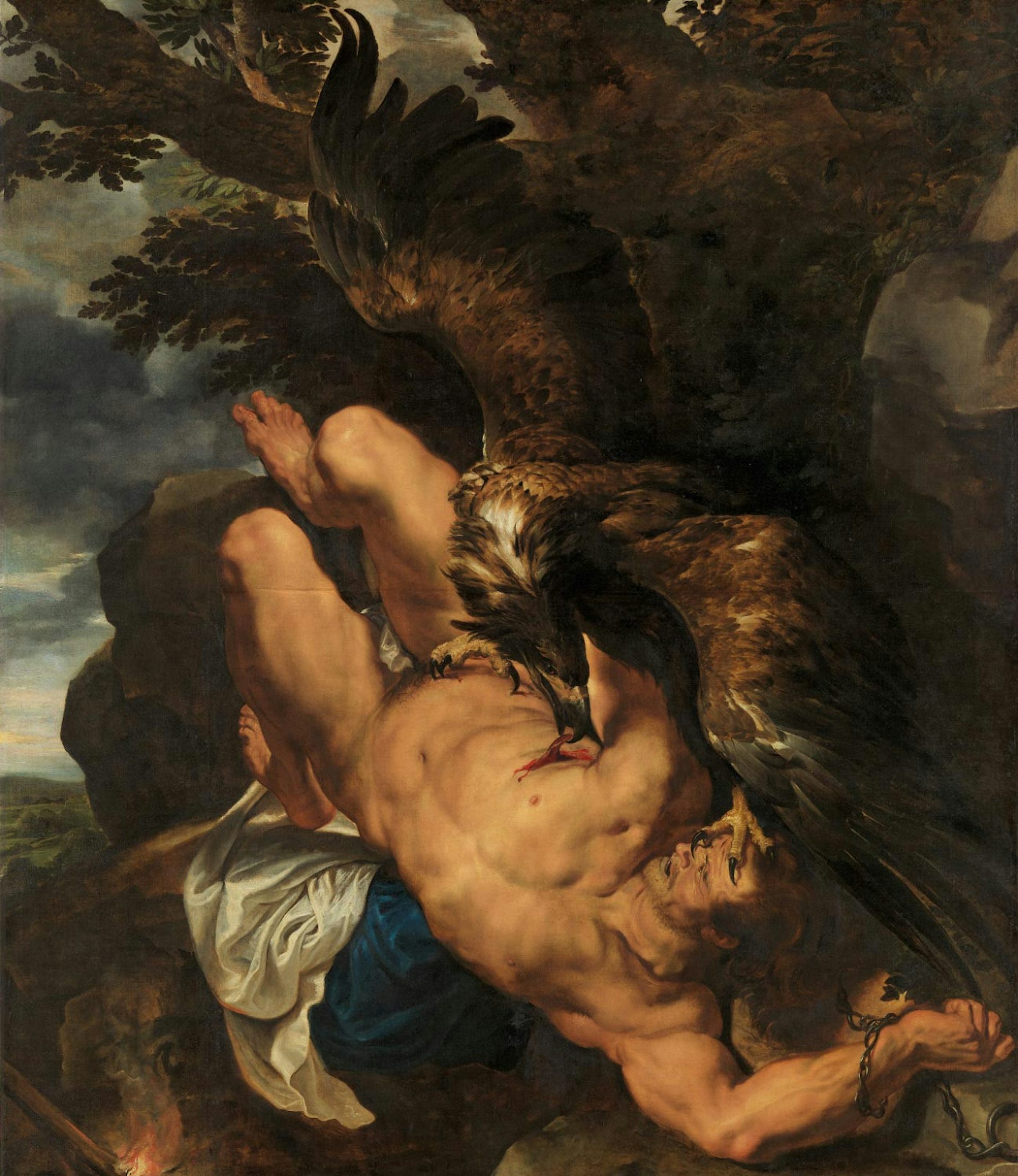
Prometheus Bound by Peter Paul Rubens (1618). Philadelphia Museum of Art.
Google Arts and CulturePublic DomainIn ancient art, Prometheus was often depicted chained to his rock or being released from the rock by Heracles. Scenes showing him stealing fire or creating human beings are less common and only began to appear in later historical periods.[4]
Family
In the best-known traditions, Prometheus was the son of the Titan Iapetus and the Oceanid Clymene.[5] There were, however, other versions in which Prometheus’ mother was Asia (also an Oceanid)[6] or Themis.[7] His brothers included Epimetheus, Monoetius, and Atlas, but also, according to some traditions, Anchiale,[8] Buphagus,[9] and Dryas.[10]
Different sources list different wives for Prometheus. These include Asia,[11] Axiothea,[12] Celaeno,[13] Clymene,[14] Hesione,[15] Pandora,[16] Pryneia,[17] and Pyrrha.[18]
Family Tree
Parents
Father
Mothers
- Clymene
- Asia
- Themis
Siblings
Brothers
Sister
- Epimetheus
- Atlas
- Menoetius
- Buphagus
- Dryas
- Anchiale
Consorts
Wives
- Asia
- Axiothea
- Celaeno
- Clymene
- Hesione
- Pandora
- Pryneia
- Pyrrha
Children
Daughters
Sons
- Aidos
- Protogeneia
Mythology
Origins
As with most Titans, little is known of Prometheus’ origins. The Olympian gods and goddesses were at the center of Greek worship, while the Titans were viewed as a distant and largely irrelevant group. What is known about Prometheus comes from a hodgepodge of Greek sources, including Hesiod, Aeschylus, Plato, and Ovid. The diversity of these sources, spread across a number of eras and regions, has led to some apparent inconsistencies in his mythology.
In the earliest sources, Prometheus was a lesser Titan known for his wit and cunning. In the Theogony, for example, Hesiod describes him as “full of various wiles”[24] and “ready-witted.”[25] According to Aeschylus’ Prometheus Bound, Prometheus switched sides during the Titanomachy and helped Zeus achieve dominion over the cosmos. In the aftermath of the conflict, he became a member of Zeus’ inner circle.
Theft of Fire and Punishment
It was not long, however, before Prometheus fell from the gods’ favor. The poet Hesiod—in two different epics—tells of how Prometheus first incurred the wrath of Zeus by playing a trick on him.[26] The gods had gathered for a banquet to forge their relationship with humankind when Prometheus presented Zeus with two sacrificial offerings. In one pile were the choice cuts of meat of a slaughtered bull, covered in unsightly skin and topped with the animal’s stomach; in the other (much larger) pile, there was nothing but bones, but these were more enticingly covered in white fat.
Zeus saw through Prometheus’ trick but chose the second option anyway: the inedible parts of the animal wrapped up in a nice package. As a result, when humans sacrificed to the gods, they would only burn bones wrapped in fat, while saving the best cuts of meat for themselves.
Zeus raged at the Titan for being arrogant enough to try and fool a god: “Son of Iapetus, clever above all! So, sir, you have not yet forgotten your cunning arts!”[27] In his anger, Zeus took fire away from humanity. However, Prometheus was as clever as Zeus had observed. When the opportunity presented itself, he snuck into Hephaestus’ workshop and retrieved the fire, then hid it in a hollowed-out fennel stalk and presented it to humanity. In Aeschylus’ Prometheus Bound (as well as other sources), Prometheus also used this opportunity to teach humanity craftsmanship and other important skills.
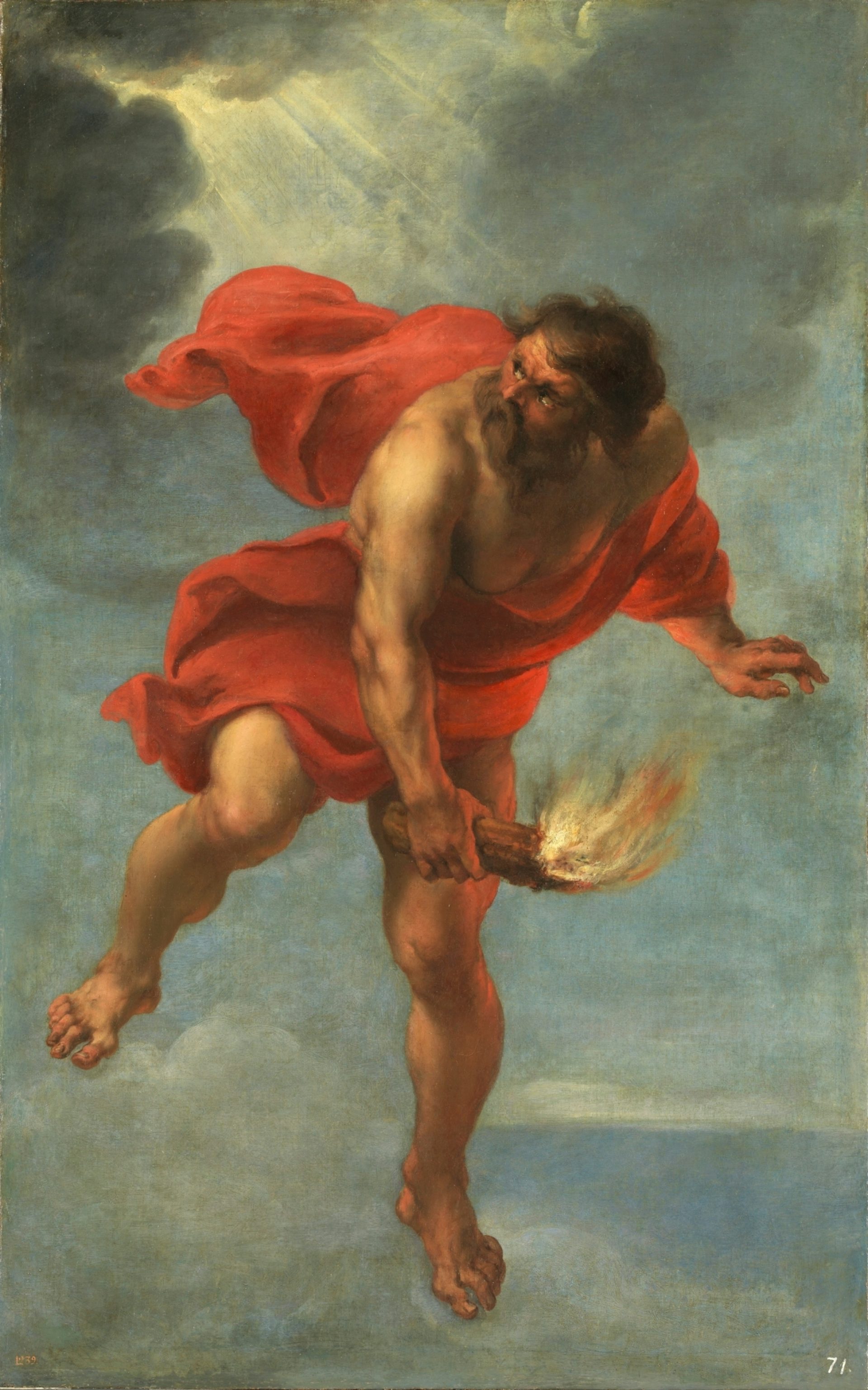
Prometheus Carrying Fire by Jan Cossiers (1630s). Museo del Prado, Madrid, Spain.
RKDPublic DomainOnce again, Zeus responded by punishing not only Prometheus but all of humanity. With Hephaestus and Athena, Zeus crafted a lovely young maiden named Pandora. Dressed in fine clothes and bedecked with jewels, Pandora was taught to be charming and coy. She was then given a jar filled with all the evils of the world (war, famine, death, disease) and sent to Prometheus’ brother Epimetheus, who married her against Prometheus’ advice.
Though she was told never to open the jar, Pandora’s curiosity soon got the better of her. Her act unleashed a host of evils on the world of men, forever spoiling the peaceful existence they once knew. Only hope remained trapped in the jar:
But the rest, countless plagues, wander amongst men; for earth is full of evils and the sea is full. Of themselves diseases come upon men continually by day and by night, bringing mischief to mortals silently; for wise Zeus took away speech from them. So is there no way to escape the will of Zeus.[28]
Prometheus himself was then chained to a rock (often said to be located in the Caucasus Mountains). Every day an eagle would eat his liver, which grew back overnight, only to be eaten again the next day. Some traditions claimed that Prometheus was eventually delivered from this torment by the mortal hero Heracles, who slayed the eagle and released the Titan from his bonds.[29]
Prometheus and the Creation of Humanity
In Hesiod’s epics and other early sources for Greek mythology, Prometheus is represented as a benefactor of humanity—but not its creator. In fact, these earliest sources do not give any clear account of the creation of mortals.
In later traditions, however, Prometheus was often said to have created the human race out of clay.[30] Ovid describes the momentous event as follows:
But one more perfect and more sanctified,
a being capable of lofty thought,
intelligent to rule, was wanting still
man was created! Did the Unknown God
designing then a better world make man
of seed divine? or did Prometheus
take the new soil of earth (that still contained
some godly element of Heaven's Life)
and use it to create the race of man;
first mingling it with water of new streams;
so that his new creation, upright man,
was made in image of commanding Gods?
On earth the brute creation bends its gaze,
but man was given a lofty countenance
and was commanded to behold the skies;
and with an upright face may view the stars:—
and so it was that shapeless clay put on
the form of man till then unknown to earth.[31]
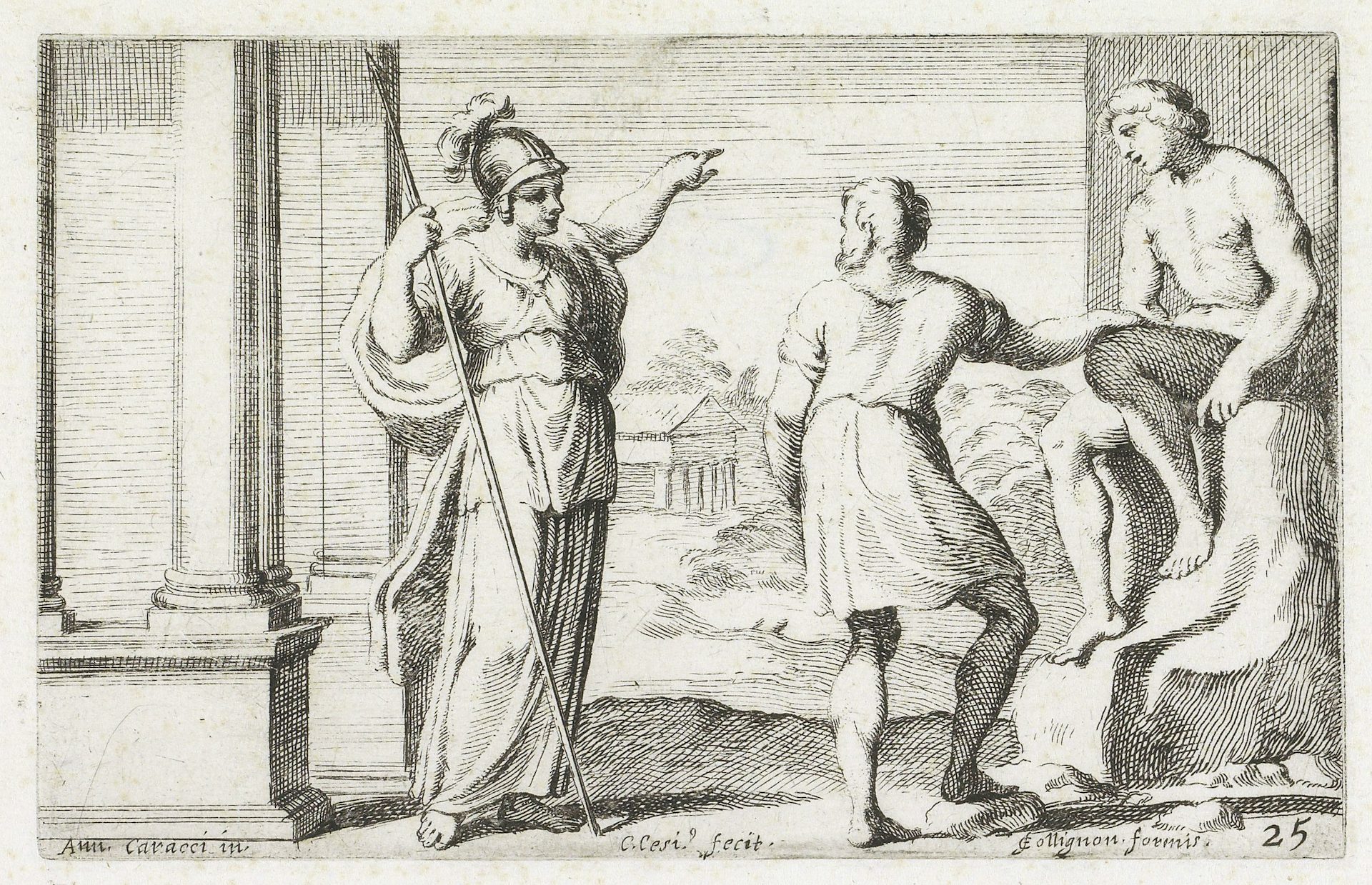
Drawn from frescos at Farnese Gallery in Rome, this print shows Athena (Romanized as Minerva) aiding Prometheus (center) as he creates a human out of clay, by Carlo Cesio after Annibale Carracci (1656).
RijksmuseumPublic DomainAccording to a fable told by Plato, Prometheus had been tasked with creating humans, while his brother Epimetheus was responsible for animals. The less intelligent Epimetheus (who lacked Prometheus’ eponymous “forethought”) gave the animals every available attribute—fur, claws, feathers, and the like—leaving nothing for man. Due to this foolishness, humanity alone was doomed to be helpless, “naked, and shoeless.” This was the reason, says Plato, that Prometheus stole fire from the gods to give to humans.[32]
Other Myths
Prometheus was closely associated with Athena, possibly because they were both gods of craft. In some traditions, Prometheus was the one who split open Zeus’ head so he could give birth to Athena (though in most versions, that part is played by Hephaestus).[33]
There were also some sources in which Prometheus fell in love with Athena. According to this less familiar version of the myth, Prometheus was chained to the cliff and tortured by Zeus’ eagle not for stealing fire, but as punishment for this forbidden love.[34]
Prometheus was also involved in the mythos of Thetis and, indirectly, that of Thetis’ son Achilles. As the story goes, the beautiful Thetis was wooed by both Zeus and Poseidon. Prometheus, however, warned the two gods that Thetis was destined to bear a son who would be greater than his father.[35]
Neither Zeus nor Poseidon was interested in such an outcome; they feared this son would ultimately take their place, just as they had taken the place of the Titans before them. Thetis was therefore married off to the mortal hero Peleus. In Aeschylus’ Prometheus Bound, it is hinted that this valuable piece of information was what eventually secured Prometheus’ release from his terrible punishment.
Worship
Despite his prominent role in their mythology, Prometheus was seldom worshipped by the ancient Greeks. His cult was largely limited to Athens, where, alongside Hephaestus and Athena, he served as part of an unofficial triumvirate of deities associated with technology and culture.
The Athenians erected an altar to Prometheus in the grove outside the Academy, a key learning center founded by Plato in the fourth century BCE.[36] This altar served as the starting point for torch races held in honor of Prometheus during the Panathenaea, an Athenian civic festival held every four years, as well as during the Prometheia, the festival of Prometheus.[37]
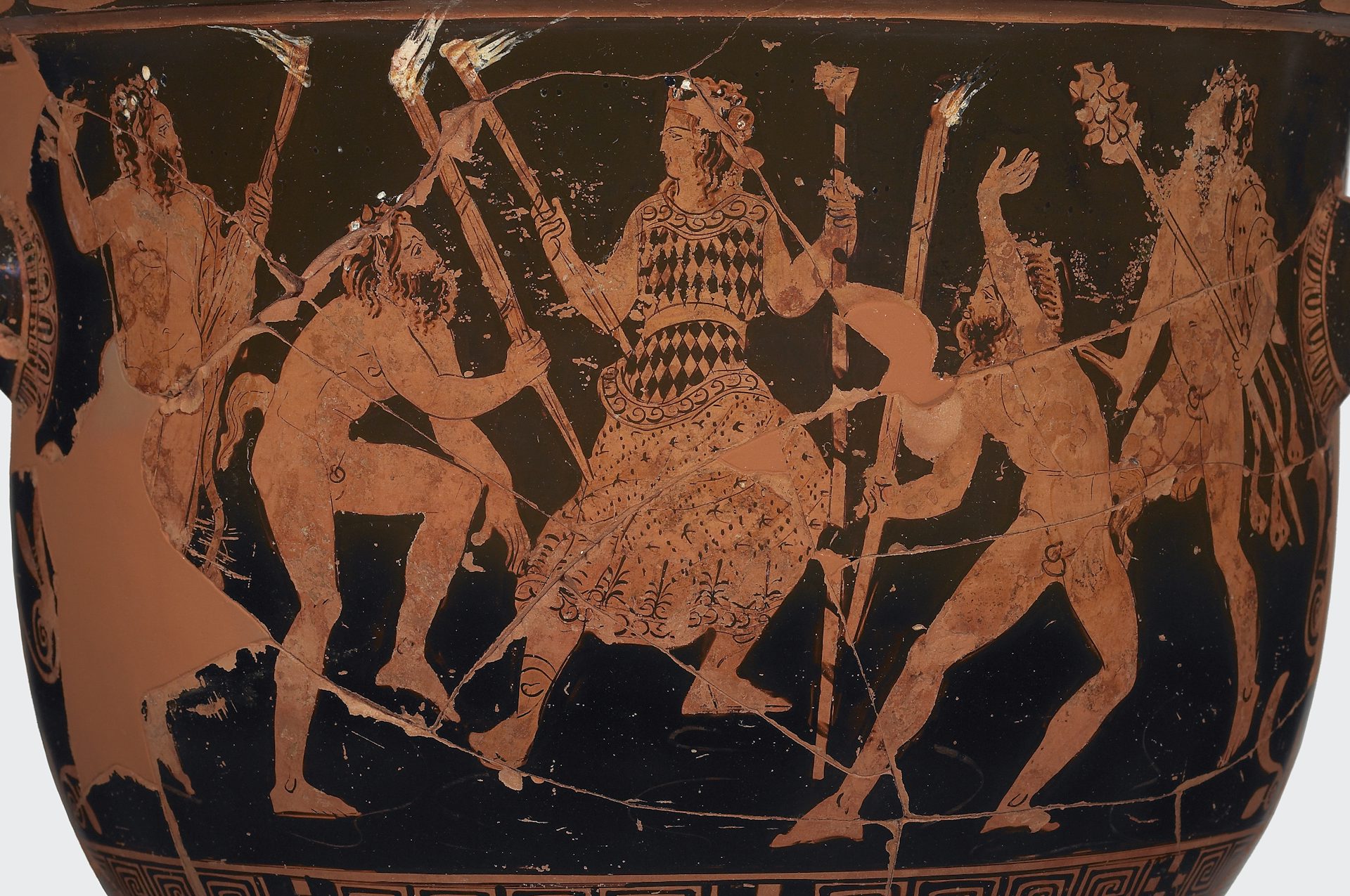
Bell krater depicting Prometheus the Fire-Lighter (ca. 400 BCE).
Yale University Art GalleryPublic DomainOutside of Athens, tombs of Prometheus were worshipped in the cities of Opus and Argos.[38] There was also a statue of Prometheus in Panopeus,[39] as well as a mystery cult in Thebes that was said to have been founded by Prometheus and his son.[40]
Pop Culture
One of the most popular figures from Greek mythology, Prometheus still thrives in modern pop culture. Unlike other ancient figures, he has enjoyed a continuous presence in the public imagination, from the Classical era to the present day.
Prometheus was a central figure in the Romantic movement in art and literature, which celebrated the unrestrained and mysterious powers of nature and man. In Johann Wolfgang von Goethe’s 1789 poem “Prometheus,” for example, the Titan rages against Zeus for crafting a fallen world. In Mary Shelley’s Frankenstein (1818), the author channels themes implicit in Prometheus’ theft of fire—namely, the dangers of pursuing knowledge beyond our reach (the novel’s alternative title is, appropriately, “The Modern Prometheus”).
Prometheus also appears in literary works by Percy Bysshe Shelley, Franz Kafka, and Ayn Rand, among others. Joseph Campbell used Prometheus in his analysis of hero archetypes, comparing Prometheus’ torment to that of Jesus, as both figures suffered for humanity.
Ridley Scott’s 2012 film Prometheus explores many of the same themes as Shelley’s Frankenstein. In this Alien prequel, the search for humanity’s origins leads scientists to a distant planet, where they discover the vestiges of an alien race called the Engineers who not only created life on earth, but also tried to destroy it by unleashing deadly Xenomorphs.
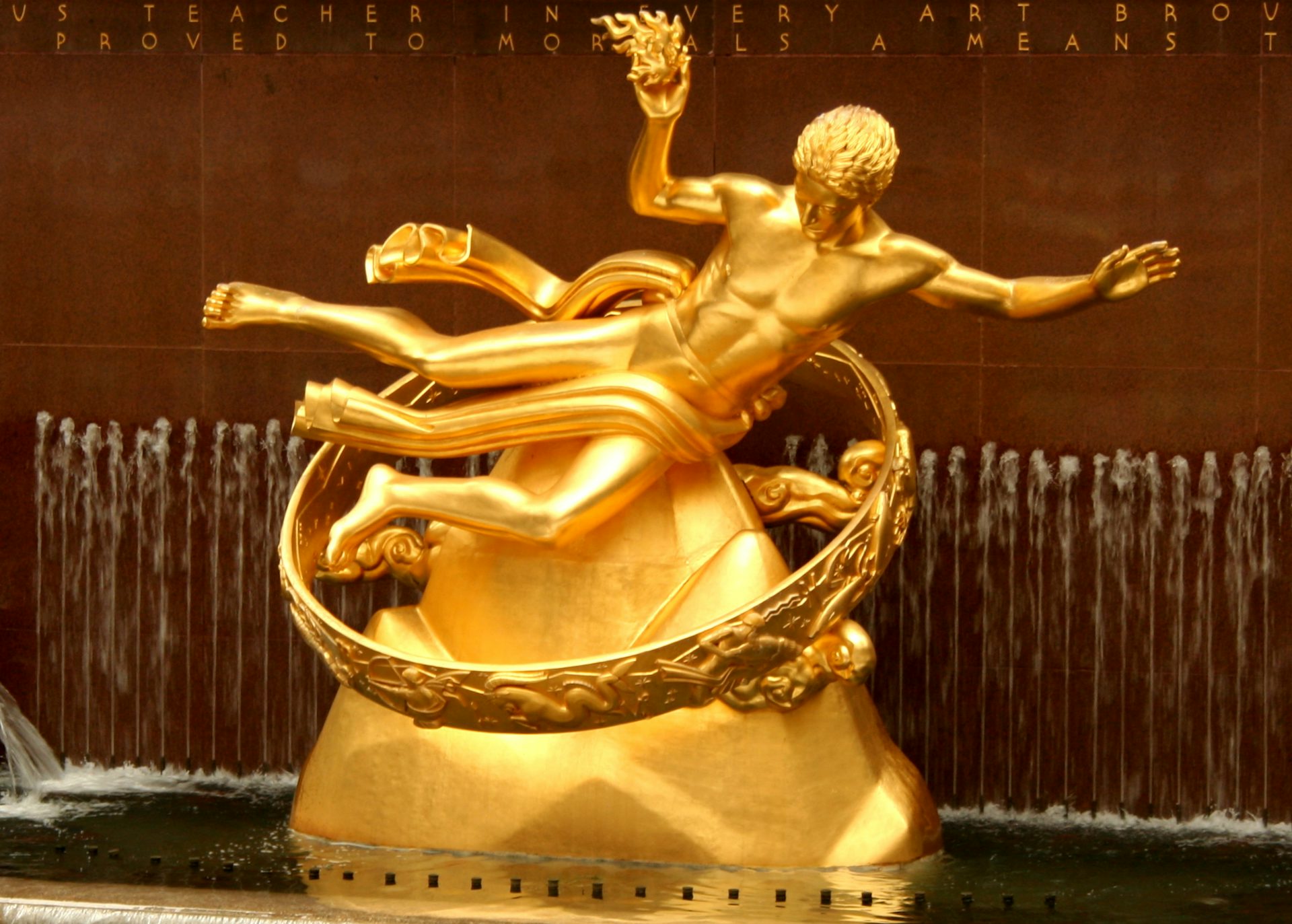
Prometheus by Paul Manship (1934). The inscription, taken from the Greek tragedian Aeschylus, reads: "Prometheus, Teacher in Every Art, Brought the Fire That Hath Proved to Mortals a Means to Mighty Ends." Rockefeller Center, New York City.
Will PowellCC BY-SA 2.0Prometheus has appeared in other media as well, such as the television show Hercules: The Animated Series and the video game God of War II. In the latter, player avatar Kratos frees Prometheus from his confinement and thereby earns “the Power of the Titans.”
Finally, Prometheus has a scientific legacy: the rare element promethium (atomic number 61) was named after him.